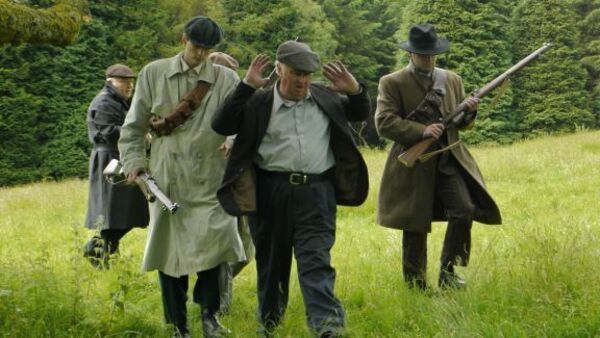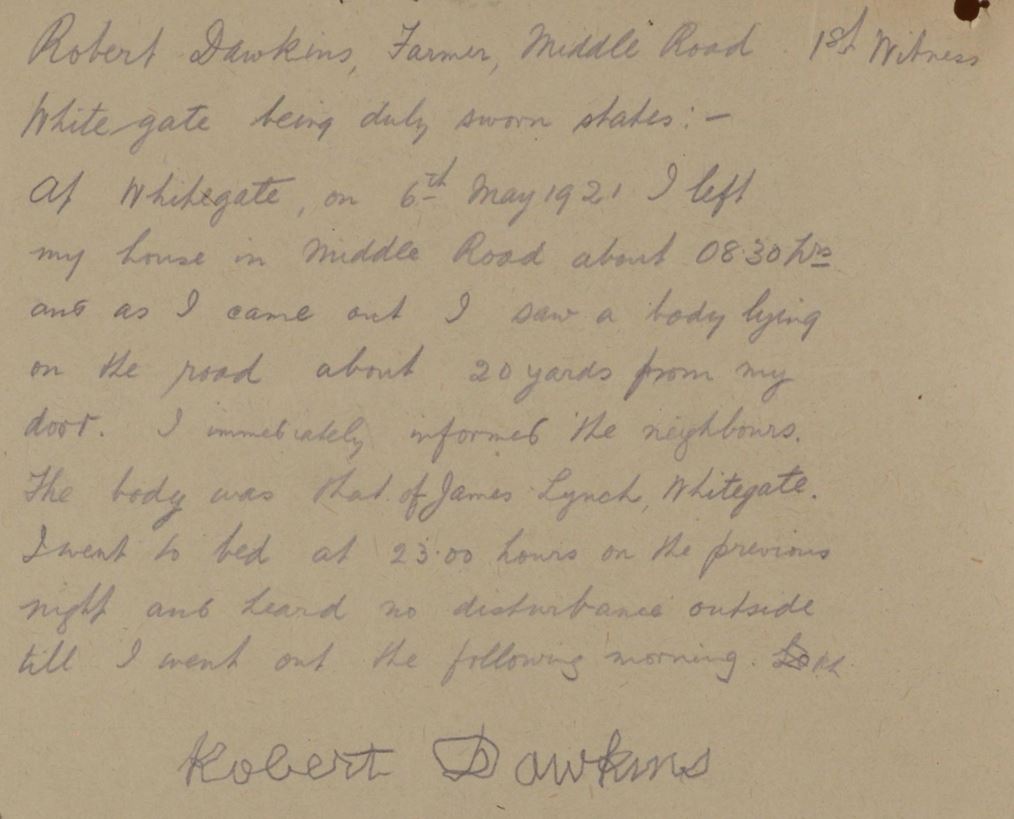Tailor's “Execution”Taken From Home, Shot Dead

“J. Lynch at Middle road, Whitegate. near Midleton, was taken from his home early on Friday morning by a number of unknown, armed men, and shot dead. Details of the tragedy are not clear.”
Irish Examiner 9 May 1921
Lynch's life met a tragic end when he was forcefully removed from his residence which was situated on the Middle Road in Whitegate, within the Midleton district, mere moments before midnight on the 5th of May, 1921. His assailants mercilessly executed him approximately 200 yards away from his home. An official record from British military archives revealed that Lynch had maintained cordial relations with a household presently placed under military protection. Adding to the complexity of the situation, Lynch's wife recounted an encounter from about seven weeks prior to his demise, where two unidentified men had confronted him. Allegations were made that sensitive information was being surreptitiously conveyed to the military from their residence. However, Lynch vehemently denied these charges.
In a grim turn of events, the assailants ominously declared that Lynch would not be afforded another opportunity to rectify his supposed transgressions. Consequently, Lynch suffered fatal gunshot wounds inflicted upon his chest and head. The brutality of the act was evident in the merciless manner in which it was carried out. The dawn that followed bore witness to the grim aftermath of this heinous crime. Lynch's lifeless body lay sprawled across the road, a stark contrast to the serenity of the surrounding landscape. It was a local farmer, Robert Dawkins who stumbled upon this harrowing sight, a chilling reminder of the violence that had transpired just hours before.
The circumstances surrounding Lynch's demise paint a grim picture of the tumultuous times in which he lived. The tension between various factions was palpable, with suspicions and accusations running rampant. In such an environment, Lynch found himself ensnared in a web of intrigue and betrayal, ultimately paying the ultimate price for his alleged associations. The echoes of Lynch's untimely demise reverberated throughout the community, serving as a sombre reminder of the fragility of life in times of conflict. His story stands as a testament to the human cost of political upheaval, a stark reminder of the violence that lurks beneath the surface of seemingly tranquil communities. As the world moved on, Lynch's memory lingered, a haunting reminder of a life cut short by forces beyond his control.
In the quiet enclave of Whitegate, nestled within the Midleton district, James Lynch's life unfolded against the backdrop of a changing Ireland, a land marked by political turbulence and social unrest. Born on the first of January in 1871 to Jeremiah Lynch, a local tailor, and Catherine Steele, James was the third eldest of seven siblings. His upbringing, rooted in the fabric of a close-knit family, provided the foundation upon which his life would unfold. As a tailor by trade, James found himself woven into the fabric of his community, his skills sought after by neighbours and friends alike. Yet, beyond the hum of daily life, a larger narrative unfolded, one characterized by the struggle for Irish independence and the simmering tensions between Irish nationalists and British forces. In the shadow of these broader currents, James forged his path, marrying Bridget Murphy on the second of October 1898, their union a testament to enduring love amidst the tumult of the times. Despite twelve years of marriage, their home remained childless, a fact that, while perhaps a source of sorrow, did not dim the warmth of their bond. The year 1921 dawned with promise, yet beneath the surface, tensions simmered, ready to boil over at any moment. It was against this backdrop that tragedy struck on the sombre night of May 5th. James Lynch's life was abruptly and violently cut short, the victim of a brutal assault that shook the quiet enclave of Whitegate to its core.
Forcefully plucked from the sanctuary of his residence on Middle Road, James met his demise mere moments before the stroke of midnight. The perpetrators, shrouded in darkness and malice, showed no mercy as they callously dragged him from the familiarity of his home, the echoes of his pleas lost amidst the stillness of the night. The events of that fateful night would leave an indelible mark on the community, casting a long shadow of fear and suspicion over the tranquil countryside. In the aftermath of James's death, whispers of clandestine dealings and secret alliances swirled through the air, weaving a tangled web of intrigue and betrayal. Yet, amidst the chaos and uncertainty, one voice rang out clear and unwavering – that of James's wife, Bridget. In the weeks leading up to his untimely end, she recounted a chilling encounter with shadowy figures who accused James of treasonous acts, allegations he vehemently denied. As dawn broke on the morning after James's death, the full extent of the tragedy was laid bare for all to see. His lifeless form, sprawled across the roadway, bore the brutal marks of a merciless assault, a grim reminder of the violence that had torn through the heart of their community.
For Robert Dawkins, a local farmer who stumbled upon the scene, the sight was a stark and sobering reminder of the fragility of life and the ever-present spectre of violence that loomed over their land. In James's death, he saw not only the loss of a neighbour but a poignant symbol of the turbulent era in which they lived. James Lynch's untimely end was more than a personal tragedy – it was a reflection of the larger forces at play in Ireland at the time. His life, cut short in the prime of his years, served as a sombre reminder of the human cost of conflict and the toll it exacted on those caught in its crosshairs. As the years passed and the memory of James Lynch faded into the annals of history, his legacy endured – a testament to the resilience of the human spirit in the face of adversity, and a solemn reminder of the price of freedom in a world plagued by strife and discord.

“It was one of the most pro-British Areas in the south of Ireland. A large majority of the inhabitants of the Company area were hostile, being largely made up of Protestant Landowners and 7 seaside villages. Practically every house in those villages were occupied by British Army and Naval Pensioners and at least 80% of them were hostile.”
MA/MSPC/A/1(10)
Cork Tailors “Execution”
At Whitegate. County Cork, a military court of inquiry assembled in lieu of an inquest found that James Lynch tailor, of Whitegate, had been murdered on the night 5th-6th May by some person or persons unknown. The cause of Lynch's death was gunshot wounds. The following are the details of the crime as told to the Court:-
On the night of May 5 James Lynch a married man, 50 years of age, went to bed at eleven o'clock. At 11-30 someone knocked at the front door. Mrs. Lynch got up to answer it. On getting to the door she tried in vain to open it, the door being held fast from the outside. The person outside then said, "We want James Lynch, the tailor isn’t it here he lives" Mr. Lynch then got up, put on his clothes, and went to the door. His wife said that he had appeared to be apprehensive of danger when the knocking at the door was first heard. Mr. Lynch then went out and a man standing outside placed his hand on his arm. Mrs. Lynch was unable to see anything of the man as a light was flashed in her eyes immediately the door was opened. She heard no following disturbance, and never saw her husband alive again. The body of Mr. Lynch was seen next morning by a neighbour at 8-30 o'clock lying on the road. This neighbour also said that he had heard no disturbance during the night.
Medical evidence showed that deceased was shot through the brain and chest, death probably being instantaneous. The victim's wife added that six or seven weeks ago two men, strangers to her, whom she has not seen since, came to her door by night. They told her husband that information was going to the military from his house. Mr. Lynch denied this statement. The men then said they would give him no further warning. Mrs. Lynch stated her husband took no part in politics. He could not read and could only write his own name.
Belfast Telegraph, Friday 3 June 1921.

The outcome of the military court of inquiry in lieu of an inquest was as follows,
“The deceased was a quiet man who had no connection with the Crown Forces or the I.R.A.
The only motive which can be assigned for his murder is that he was friendly with a family now under Military protection.”
Capt. A D Curtis
Bridget Lynch was later awarded £725 compensation for the death of her husband under the Compensation (Ireland) Commission (Shaw and Wood-Renton Commission). Following the Truce of 11 July 1921 and the advent of an uneasy peace in Ireland, a working agreement was reached between British and Irish Ministers on the implementation of Articles of Agreement subsequently embodied in the Act of the Imperial Parliament setting up the Irish Free State Constitution (13 Geo. V sess.2 c.1). Part of the Agreement admitted the principle of compensation for those who had suffered loss or injury of the kind governed by the enactments relating to Criminal Injuries, including those sustained during action taken by the military operating under martial law.